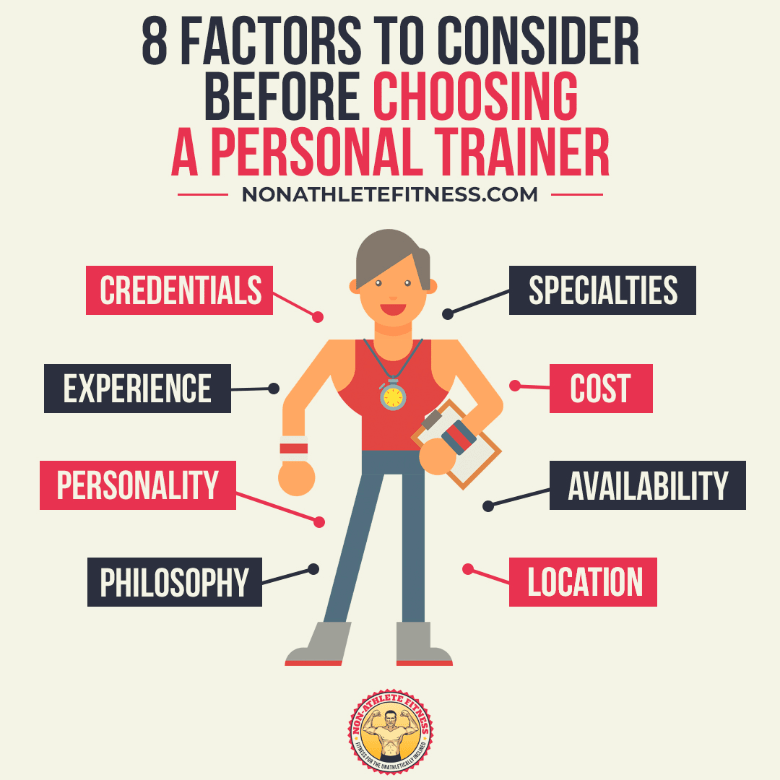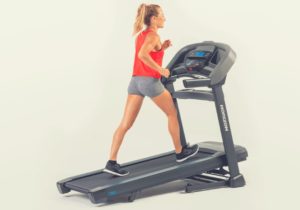Have you been considering signing up for personal training and just can’t make up your mind whether or not it’s worth it?
Maybe you just don’t have all of the information you need in order to make an informed decision.
If that’s the case, here are some things you may want to consider.
Should You Invest in Personal Training?
What to Expect From Personal Training
It’s difficult to make a decision when you aren’t really sure exactly what to expect from personal training, so let’s tackle that, starting with the first visit.
You Will Be Weighed.
Even if losing weight is not your primary goal for signing up for personal training, it’s important to know what your starting weight is, to use as a baseline.
If you do want to lose weight, then this will be a tangible measurement of your progress. Seeing the numbers go down will be very motivating.
If you just want to be more fit, then it may still be an indication of your progress, since muscle weighs more than fat.
In that case, you may actually see the numbers go up before your progress is visible to you in the mirror.
You may also be given the choice of having your body fat measured, and this is a good idea regardless of your reason for wanting a personal trainer.
This measurement is a reflection of your health, as well as your fitness, and it is a clear indication of progress in either case.
You Will Discuss Your Health And Goals.
One of the first things your trainer will want to know is if you have any health conditions that need to be considered, or if there are any particular exercises you can’t do for any reason.
Any information at all will be helpful.
I once saw a trainer for the first time who put me on an exercise bike, to see how long it would take me to reach a particular heart rate.
The problem was, my heart rate had always been at the lowest side of normal my entire life.
My legs were ready to give out long before I ever came anywhere near the desired number.
It was still good information for the trainer to have, though, because even a somewhat high number at any time could have been a danger warning in my case.
You may want to give some consideration to your goals before your first appointment. It may not be necessary to lose as much weight as you think.
If your weight is severely affecting your health, that’s one thing.
But if you just want to look better in your clothes, the number on a scale isn’t as important, because gaining muscle and losing fat may accomplish that well before reaching a lower weight.
Your Trainer Will Create a Plan Just For You.
Everyone is different.
Bodies are shaped differently, and an exercise plan has to reflect that.
For instance, some people have strong legs, but little upper body strength or vice versa.
There is no way to lose weight from specific parts of the body, but it is definitely possible to pinpoint exactly where you want to develop muscle, and that is an enormous help in getting the shape that you want.
Also, if you would prefer a more toned look than muscular, that will affect which exercises your trainer will have you do.
You Will Work Out.
Yep, from the very first session, your trainer will start putting you through your paces, so make sure you are dressed to sweat.
This is actually another way to determine a baseline of where you are at the moment – how much weight, how many reps you can handle, how much further can you reasonably and safely push.
What Comes Next?
Your customized personal training plan will very likely not only include weights.
There could be aerobics, squats, lunges and more.
You will meet with your trainer however often the two of you have agreed is reasonable, and the trainer will guide you through the planned regimen.
It is also probable that you will not be doing exactly the same activities every time you work out.
You may be wondering, if you can get so much information from the first visit with a personal trainer, is there any reason why you shouldn’t just do the rest on your own at the gym?
Well, let’s compare the two, and then you can decide.
In-Home Personal Training vs. Gym
There are some very real, and important, differences between working out with a personal trainer and doing it yourself at the gym.
Safety
Even if you have been going to a gym for years, that is no guarantee that you are doing it right.
A personal trainer is an expert, and can look at your technique with a professional eye that is far better than what you see in the mirror.
If you get any kind of injury whatsoever at a gym, it could cost you literally months of progress.
One of the most crucial responsibilities personal trainers have is preventing injury.
Accountability
If you are even considering the possibility of personal training, then chances are, you haven’t entirely been a success at keeping up a fitness schedule.
It’s easy to skip the gym when it’s too early or too late, when the weather is bad, you’re too tired or you just don’t feel like it.
Having a gym buddy can help with that somewhat, but not nearly as much as having someone you are paying to help you.
Progress
Personal trainers can maximize your progress in two ways.
They will:
- Push you to your limit – You may not think you can “hold for just 1 more minute” or actually pull off 10 more reps. But you will. Because your trainer told you to.
- Switch things up – When you seem to hit a plateau, or get bored with your workout, your trainer always has something new in store that will keep you going. There are many different ways of achieving the same result, and chances are, you don’t know all of them. Maybe your trainer doesn’t either, but almost certainly more than you do.
Knowledge
A little knowledge is a dangerous thing, especially when it comes to working out in a gym.
There is always the very real danger that you can hurt yourself, or even someone else, if you don’t know exactly what you’re doing.
Putting weights on wrong, not handling or using equipment correctly, even not wiping off a seat as thoroughly as you should after sweating all over it.
When you have a personal trainer, you have a professional right there to show you how things are supposed to be and answer any questions you might have.
But even better, they can tell you why things are the way they are – what certain exercises do, why you should do certain things.
A lot of trainers even know a good bit about nutrition, and can answer some questions about what and when you should be eating, as well.
Personal trainers are fountains of information about fitness, and they are usually very happy to share that knowledge with their clients.
So you should take every opportunity to pick their brain for useful information about your specific situation.
Questions to Ask Personal Trainers

Of course, before you decide on exactly which personal trainer to work with, there is some very vital information you need to ask for.
It’s important to choose the trainer who is best suited to help you achieve your goals.
Do You Have a Specialty?
If you are training for something specific, say a marathon, it would be great to have a trainer who is also a runner and can help you focus on what will help you most.
If you are trying to lose weight, a trainer who has a particular knowledge of nutrition can help you attack that problem from both directions.
What Are Your Qualifications?
Unfortunately, it is fairly easy to be an official personal trainer in some locations.
Sometimes, there is actually not even a certification required.
Particularly if you are looking at an independent trainer, one who is not affiliated with any gym, it is of utmost importance to verify qualifications.
In those cases, asking for references is not a bad idea, either. You will also want to find out how long they’ve been a trainer.
What Exactly Does Your Program Include?
How long and how often are the sessions, do they weigh and/or measure you every week?
What about nutrition? Are there other options for extra fees?
There are actually some personal trainers who take a holistic approach and will help you develop meal plans, but that’s certainly not something you can assume is standard.
How Many Times do I Need to Work Out?
This is not a question with a quick or simple answer.
You should take the time to discuss this in depth with a trainer.
They will tell you what rate will be the most effective, but you need to make sure that you can realistically plan for it between work and any other obligations.
Particularly if you haven’t been very diligent about spending time in a gym, you have to be honest with yourself about your limits.
How Soon Do You Think I’ll Start to See Results?
A lot of this depends on you and, of course, everyone is different.
But most people are much more gung ho at the start of a new fitness regimen, so a trainer with a lot of experience should be able to give you an answer that is at least somewhat accurate.
How Long do You Think it Will Take to Meet my Goals?
This is a much more difficult question and you don’t actually want a precise answer to it.
In fact, if it sounds too good to be true, that should set off alarms to look for someone else.
A true professional will acknowledge that everyone is different, and a great deal depends upon how hard they are willing to work.
But someone with a lot of experience should be able to give you average weights within about a 10 pound range during a certain amount of time.
What Changes Would You Make if I Don’t See Any Results?
Of course, this would depend somewhat on whether you were counteracting the effects of your workouts by not paying attention to your diet.
But if you are doing everything your trainer tells you to, and are really not seeing much – if any – effect, then you want to know if your trainer has any plan for that or if you will need to just find another one.
The answer could be anything from changing your diet, to increasing cardio or weights. But it’s a good sign if they can offer you some kind of contingency plan.
Do I Need Any Equipment or Supplies?
Even if your trainer brings all the weights and exercise accessories required for your workouts, will they want you to have a food scale, a blood pressure or heart monitor?
Will you be expected to keep a training journal?
What is The Cancellation Policy?
You need to understand that this is a person’s livelihood, their business is based on a schedule of clients who are billed per hour.
That means, when they have no client, they don’t get paid.
Because of this, most trainers will have a 24 hour cancellation policy, which allows them time to fill the hour they had reserved for you.
It’s important that, whatever their cancellation policy is, you both agree to it and will have no difficulty in abiding by it.
Final Thoughts
Hopefully, you now have all of the information you need, in order to decide whether it would be worth it to start working with a personal trainer.
Not everyone needs to.
There are plenty of people doing just fine on their own, taking advantage of all the classes and/or equipment that a gym provides.
They have achieved and are maintaining their fitness goals.
If you haven’t yet, though, there is probably a reason for that.
In fact, if you think about it, there are actually several options for losing weight and becoming more fit, other than going to the gym.
Even something as simple as walking regularly could make a difference.
There are certainly multiple reasons why personal training is better for some people, but the main one is that if you could have gotten the results you wanted on your own, wouldn’t you have accomplished that by now?
So what it really comes down to, is how much is it worth to you to achieve your fitness goals.





